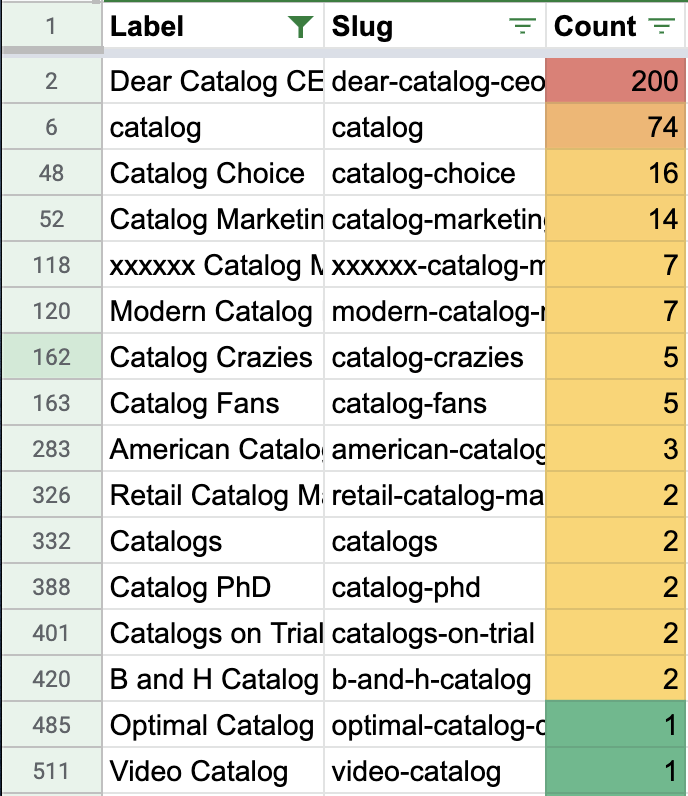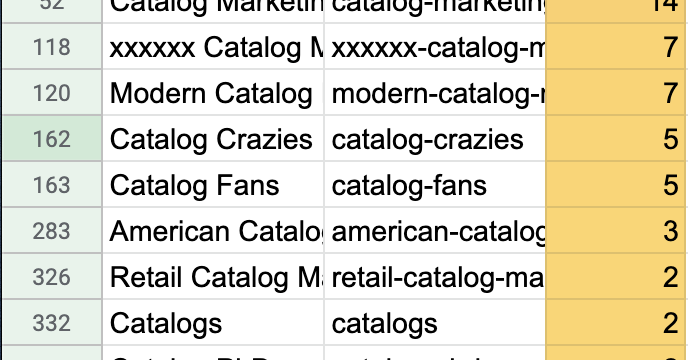We discussed some tips for how to tag your content. But once that is done, or if you’ve tagged as you’ve gone along, what’s next?
Once you’ve gone through your tags you should have a good sense of what you have in aggregate and start seeing interesting connections between content.
I have some good tips for doing this quickly here.
Identify distinct tags and consolidate similar ones (synonyms)
You may have no brainer synonyms, or more likely, words that might not mean the same thing in the dictionary sense, but that you are using to mean the same thing, like “strategy” and “insights” or posts filed under a mix of “how to” and “guides.”
This is called conflation, and for you it feels congruent, harmless, to use different terms for the same intent. For the user, it is potentially incongruent conflation, meaning the use of both terms often leads to additional confusion.
I love the related vs similar distinction for getting clarity here. Some tags are subsets of others, or closely related. For example, take:
“Keyword intelligence”, “keyword map”, “keyword strategy.”
Those are all similar enough to be consolidated into one grouping of posts for consideration in the greater information architecture that your site will be.
I would give all the posts here a primary tag, like “keyword research,” and keep any of those more granular distinct tags that felt different from “keyword research.”
In this case, a “keyword map” is a useful tool for visualizing what search intent (goal) users may have that would bring them to a given page. For now, it should keep its own tag and also get the primary tag.
How to choose which term to use as the primary one?
Clarity, competition, comfort.
Clarity – Does my audience say “keyword research” or “keyword strategy”? Does one mean something different to them?
Competition – Is “keyword research” completely overrun with competitors? (yes) At 6.3 million Google results, I’d rather aim for the broader, but lower competition “keyword strategy.”
Comfort – If you lean toward saying one, as long as it’s clear to the user, and you aren’t trying to rank for that term directly, I would just go with what is most familiar.
Alternatively, if you are making a term your own, like it is a phrase you use or related to your thought leadership, then it makes sense to keep it that way and worry about how other will wrap their mind around the idea later.
Don’t get too caught up in the “right” answer.
Tags vs category-subcategories
All relationships follow a structure (with a strength and direction). There is such a thing as “bidirectional” but its an abstraction that loses too much data. We may be friends and you might think of that as equal, and therefor bidirectional, but there is always an initiator when a friendship forms.
In that way, related tags will have some structure to the relationship.
“Tags” are labels, they are non-hierarchical by nature while category > subcategory follows a hierarchy.
Thinking about this structure will help you determine whether the relationship is hierarchical (category > subcategory) or adjacent (tag, related tag.
You can be a boy and a marketer but a marketer is not a type of boy. You can be an expert and a marketer, but marketer is not necessarily a subcategory of expert.
What makes it a subcategory <> category relationship? Context.
A banana is a subcategory of fruit, but even then, context matters. If you write about bananas all day and very little on other fruit, then bananas are a top-level category, and other fruit posts might get labeled “misc fruit” and not have a category at all.
This will actually reveal itself to you and there are some rules of thumb.
As we said, many tags are actually synonyms, groupings of posts that can be combined if you relabel one similar tag for another. (If you’ve already tagged a bunch of articles over time, you can go through this exercise before starting with anything else.)
Many tags are actually categories and subcategories.
You will find these when you query for overlapping tags. If you find that most or all posts with one tag also have another tag, it is a good chance that it is a subcategory.
All of my “keyword research” posts are also tagged as “SEO.” But not all my “SEO” posts are tagged as keyword research. This is a hint that “keyword research” could be a subcategory of “SEO.”
Similarly, reviewing a site with 4k articles and 1.8k tags, I found many instances of the expert changing their preferred terms over time. For them, “direct marketing”, “catalog”, “circulation”, “zip code” were all highly related. One term would have sufficed to group those together, consolidating
What’s interesting about this little rule is it means we can semi-automate some of deciding whether two overlapping tags are similar, related topically through adjacency, or related hierarchically somehow.
What if you don’t have enough content to make a category?
That’s fine!
Back to our misc fruit example. If I have a couple non-banana fruit posts, I can keep them tagged that way. At least they are all in one place. At some point I might find that describing the banana in context of the larger fruit kingdom is useful. In that way, it may end up repurposed as a subsection of a guide on the history of bananas or an output of misc fruit posts listed and linked as related reading.
What if you already tagged everything and you have hundreds or thousands of tags?
This is actually great. You are ahead of the curve.
As long as you have stripped tags out of your templating, these aren’t hurting anyone by existing. As soon as these are linked on your posts and creating their own archives, you have technical SEO considerations to deal with UNLESS you have very little traffic, in which case, you don’t have much to lose by stripping those out.
Having tags be an internal organization tool in your CMS means it’s fine if there are hundreds or more. If you have 200 tags that only have one post each, that’s also fine.
Your goal is to identify large clusters of topics and content that matter. When you are done, those lingering tags can just be ignored and kept on file for future organization as things inevitably change.
Maybe you tagged a post about bananas with “Miami” because you were drawing some analogy between how bananas are prepared in Miami vs other similar cities in tropical-ish climates. That means nothing for your content organization now, but after writing 20 posts about how bananas are used in cooking in different cities, you suddenly have an easy way to round up all those posts (those with overlapping <geography> and cooking tags).
Identifying patterns in overlapping topics
This is the type of non-obvious relationships between your content you may uncover. This is also a great way to brainstorm authoritative content that you didn’t necessarily set out to create initially.
You can do this easier than you think, export a list of your tags and drop them into a word and phrase frequency counter like the ngram Analyzer.
Let’s take an example. This is someone who has spent 4,000 days writing posts and has no traffic. Running their list of 1,800 tags through an ngrams tool, we see the most common keywords found throughout tags:
48 marketing
24 catalog
23 multichannel
20 customer
18 online
15 mail
This means that 31 distinct tags have the word catalog in them. The sum of those posts with a tag that has the word catalog or what is being used as a synonym topically (“circulation”) is 325. We have 31 tags for about 325 catalog related posts.
Now that we’ve identified a unique top-level topic on this site, we can drill down into the tags matching catalog or related terms:

Interesting! 200 posts are letters intended for CEOs of companies that send direct mail catalogs. I would be VERY interested to understand the mix of other labels being used on thoses posts. What kinds of conversations is this expert having with catalog CEOs specifically?
Organizing your content makes your expertise more clear and robust
For me personally, if I run a search on all posts that have “Email List” and “Personalization” in them, or “Organize Your Content” and “SEO,” or can export all posts and take a look at number of posts with the most tags, and most overlapped two tags, I can very quickly see what my content is about.
Because, I could tell you I thought I wrote a lot about graphs, organizing content, and SEO. But at different points I’ve been very weighted in directions like focusing on an email list, or considering social vs search for experts with content, or habits around developing expert content, or whatever.
Exploring everything there is to know about how bananas from culture, to food prep, to history could suddenly put you in a position to write something incredibly useful that no one has ever been in a position to create. And you will already know what you’ve already written on the subject during a consolidation or spin off article.
Your brain does not do a good job of ball parking how much of what kind of content you’ve created. Heck, I’ve seen multiple posts that are pretty much the same where I forgot I wrote about something and re-wrote the same thing, and that’s not even looking at partial overlap.
You might also be surprised when you start organizing your content what you have and what the hive mind of thoughts adds up to.
